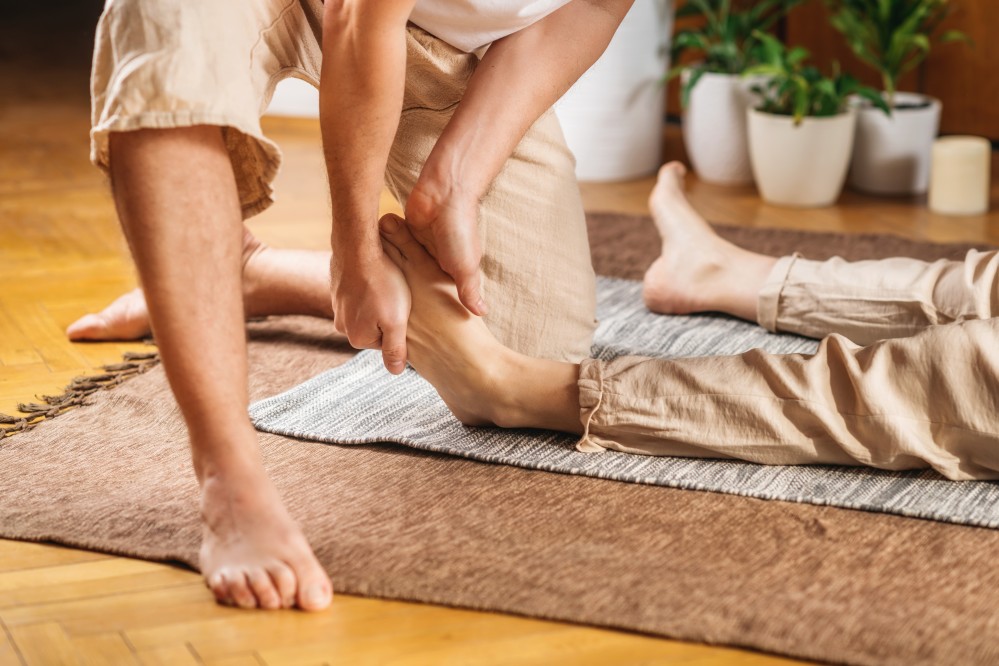Our feet are truly remarkable; they support us through every step we take, making even the most mundane activities possible. However, this constant use can lead to tension and discomfort, ultimately impacting our overall health and well-being. Fortunately, foot massage can ease tension and pain and offer numerous benefits for the mind and body.
In this article, we’ll explore the importance of foot massage and answer common questions like why it is important to massage your feet, how often you should get a foot massage and more.
The Top 13 Benefits of Foot Massage
A foot massage can provide much-needed relief after a long day of working or running errands. But such a massage doesn’t just feel good; it also has numerous health benefits. Read on to learn more!
1. Healthier feet
Our feet bear the weight of our entire body and are essential for even the smallest daily tasks. That’s why treating them to a gentle yet stimulating massage can work wonders in keeping them healthy and happy.
A good foot massage can relieve tension and stiffness and promote better circulation and flexibility in the feet, preventing foot-related ailments such as plantar fasciitis, flat feet, and bunions. Taking care of your feet with regular massage can lead to overall better foot health, which in turn can help you stay healthy and active.
2. Higher levels of calm and feelings of well-being

Foot massage can do wonders in promoting relaxation and improving overall well-being. Studies show that foot massage can help reduce stress and anxiety as well as lower blood pressure. Additionally, foot massage can stimulate the production of endorphins, the body’s natural painkillers, thus promoting a sense of well-being.
So, treating yourself to a foot massage can provide not only immediate relief but also long-term benefits for your mental and physical health.
3. Relieves nausea and pain
Aside from promoting relaxation, foot massage can also alleviate symptoms of nausea and pain. If a person is experiencing nausea due to emotional distress or sickness, a foot massage can be incredibly beneficial.
This relief is achieved by applying pressure to the top of the foot, just below the area where the big toe meets the second toe. Massaging this reflex point can stimulate various organs, such as the heart, large intestines, and stomach, helping relieve nausea and pain.
4. Lowers blood pressure
High blood pressure, also known as hypertension, is a common condition often caused by poor diet, lack of exercise, and stress. Fortunately, regular foot massages can help manage this condition effectively.
Hitting the right pressure points, has been found to be helpful in maintaining healthy blood pressure levels. Studies show that foot reflexology can lower systolic blood pressure and decrease blood triglyceride levels in people with hypertension.
By enhancing relaxation, foot massage can reduce stress and promote better circulation, leading to healthier blood pressure levels. With regular foot massage, individuals with hypertension can experience significant improvements in their blood pressure readings, contributing to better overall health and well-being.
5. Improves circulation
Studies show that foot massage can improve blood flow. Improved circulation can lead to a variety of benefits, including reduced discomfort and swelling, enhanced mobility, and an overall sense of well-being.
Additionally, the relaxation that comes with a foot massage can help reduce stress, which can also contribute to better circulation and overall health.
6. Reduces edema

Edema is a condition characterized by swelling due to excessive fluid accumulation in the body’s tissues. While edema can occur in any part of the body, it most commonly affects the legs and feet. It is often associated with pregnancy or underlying health issues such as diabetes, heart problems, and kidney disorders.
While resting and following a proper diet can help manage edema, foot massage has been shown to be an effective therapy for reducing swelling. Daily foot massage can help stimulate blood flow and lymphatic drainage, eliminating the excess fluids that cause swelling.
In addition to reducing swelling, foot massage can also help relieve pain and discomfort associated with edema. The pressure applied during the massage can help release tension and promote relaxation, further supporting the body’s natural healing process.
7. Alleviates heel pain
Chronic heel pain is common for individuals with flat feet or a low foot arch and can cause discomfort during daily physical activities. This pain can occur due to inflammation or degeneration of the plantar fascia—the connective tissue in the foot’s arch.
Fortunately, daily foot massages can be an effective way to reduce this pain. By focusing on massaging the foot arch and applying pressure, foot massage can help improve circulation and promote the healing process of the inflamed or damaged plantar fascia. In some cases, regular foot massage may even lead to a complete resolution of chronic heel pain.
8. Helps prevent foot and ankle injuries
Foot and ankle injuries can be common issues for many people, but incorporating regular foot massages into your wellness routine can be an effective way to help prevent these injuries. Additionally, research has shown that foot massage can promote recovery from physical injury and alleviate muscle soreness and joint pain.
Regularly massaging your feet can help improve your balance, flexibility, and overall foot health, which can reduce your risk of foot and ankle injuries. Furthermore, foot massage can help promote circulation and increase the flow of nutrients to the muscles and joints, helping to speed up the recovery process and reduce muscle soreness.
9. Relieves tension, stress, and anxiety

Foot massage is a simple yet effective way to reduce tension and stress and promote relaxation. Studies have shown that foot massage can be beneficial for lowering patients’ stress levels. In addition to reducing tension and stress, foot massage can also be effective in reducing anxiety and depression.
10. Helps with PMS and menopause
That’s right, ladies—treating yourself to a foot massage during that time of the month is more than pampering yourself. Studies show that women who received foot massages reported reduced premenstrual (PMS) symptoms (i.e., bloating, mood changes, and cramping).
The same goes for women who are going through menopause. During this period, they tend to experience various disruptive symptoms that can, fortunately, be soothed by foot reflexology.
The benefits of foot massage during these transitional periods for women are largely due to the application of pressure on specific reflex points on the feet. By stimulating these points, foot massage can help release tension and promote relaxation throughout the body, which can lead to a reduction in physical and emotional discomfort.
11. Reduces headaches
Suffering from headaches can significantly impact a person’s quality of life. Luckily, foot reflexology can be an effective and natural way to alleviate headaches and migraines.
During a foot massage, specific reflex points on the feet are targeted, which can help to release tension and alleviate pain throughout the body, including the head. The pressure applied to the inside of the big toe and second toe during a foot massage can relieve tension in the temporal lobes, reducing the frequency and intensity of headaches.
12. Improves immunity
A strong immune system is crucial for maintaining good health and fighting illnesses. Regular foot massage can play a significant role in improving and strengthening the immune system.
Stimulating the feet with moderate pressure during a foot massage can help to increase the circulation of lymph fluid, which carries white blood cells throughout the body. These white blood cells are responsible for fighting off harmful bacteria, viruses, and infections, ultimately leading to a better immune system.
Additionally, foot massage can be effective in reducing the levels of the stress hormone cortisol, which can weaken the immune system. By reducing stress and promoting relaxation, foot massage can help boost the body’s natural ability to fight infections and diseases.
13. Promotes better sleep
Sleep is crucial for overall health and wellness. However, with our busy schedules, falling asleep quickly and getting enough rest can be challenging. Foot massage can help in promoting better sleep by inducing a state of calmness and relaxation.
During a foot massage, the pressure applied to specific points on the feet can help soothe the nervous system and release endorphins, providing a soothing and relaxing effect.
How Often Should You Get a Foot Massage?

Foot massage is generally safe and can be enjoyed on a daily basis. Unlike deep tissue massage, foot massage uses light strokes, so your feet won’t feel sore. However, it is important to be aware of any medical conditions that may prevent you from receiving regular foot massages.
For instance, people with certain conditions, such as deep vein thrombosis or neuropathy, may need to avoid foot massage or seek the advice of their healthcare provider before starting a foot massage regimen.
Additionally, if you experience any pain or discomfort during a foot massage, it is important to communicate with your massage therapist and adjust the pressure or technique as necessary.
The Bottom Line
Regular foot massage can provide many benefits that can positively impact your physical and emotional well-being. Along with improving circulation, foot massage can reduce tension, swelling, anxiety, stress, and pain.
Whether you have a medical condition or simply want to unwind and de-stress, a relaxing foot massage can be a valuable addition to your self-care routine.
If you are interested in exploring the many benefits of massage therapy, acupuncture, or other alternative healing treatments, don’t hesitate to reach out for more information. Our team is dedicated to helping you achieve optimal health and wellness, and we would be happy to answer any questions you may have and provide guidance as you navigate your wellness journey. Contact us today to learn more about how we can support your health and well-being.
Frequently Asked Questions (FAQs):
Is it good to massage your feet every day?
Yes, daily foot massages can improve circulation, relieve tension, and promote relaxation.
What happens to your body after a foot massage?
A foot massage can reduce stress, alleviate pain, improve blood flow, and promote better sleep.
How long should a foot massage last?
A typical foot massage lasts between 10 to 20 minutes, but even a short 5-minute session can be beneficial.
Can you overdo a foot massage?
Yes, excessive or overly intense foot massages can lead to soreness or irritation. It’s best to keep them gentle and moderate.